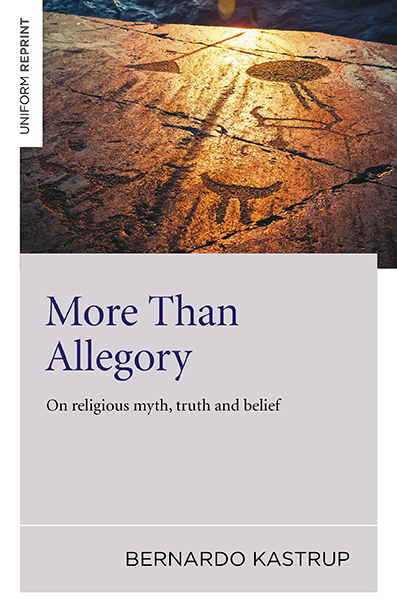More Than Allegory
A plausible, living validation of religion that doesn't contradict reason.

A plausible, living validation of religion that doesn't contradict reason.
A plausible, living validation of religion that doesn't contradict reason.
Comparative religion, Metaphysics
This book is a three-part journey into the rabbit hole we call the nature of reality. Its ultimate destination is a plausible, living validation of transcendence. Each of its three parts is like a turn of a spiral, exploring recurring ideas through the prisms of religious myth, truth and belief, respectively. With each turn, the book seeks to convey a more nuanced and complete understanding of the many facets of transcendence.
Part I puts forward the controversial notion that many religious myths are actually true; and not just allegorically so.
Part II argues that our own inner storytelling plays a surprising role in creating the seeming concreteness of things and the tangibility of history.
Part III suggests, in the form of a myth, how deeply ingrained belief systems create the world we live in. The three themes, myth, truth and belief, flow into and interpenetrate each other throughout the book.
Click on the circles below to see more reviews
Previous books by Bernardo Kastrup have provided a scathing critique of scientific materialism and a strong advocacy of a worldview based on the primacy of consciousness. This book addresses the relative status of religious myth, truth and belief in relation to each other in a rigorous way. The overall thrust is that the universe is becoming self-aware through us, but we are misled by our current consensus reality that there is a real world outside consciousness. Myths are in fact a means of embodying transcendent truth and not just to be taken allegorically. Their significance can be apprehended intuitively. The author’s experience of the cross in Cologne Cathedral revealed to him the transcendent truth of this Christian symbol so that he experienced it for himself. In a spiritual sense, the quest for truth is also a quest for inner peace. In the process, not only the ego but also the notion of truth itself need to be deconstructed while we come to the realisation that past and future are both constructs and, given the primacy of consciousness, truth is inherently subjective, even though it can be shared in terms of perceptions, explanations and predictions. All this, according to Kastrup’s perspective, takes place within Mind at large. The third part on belief takes the form of a story/dialogue exploring the themes in more depth as lenses that define our perceptual possibilities. This leads to an interesting discussion of death as a transition from observing the universe to being the universe, from dreaming to conceiving, reflecting another aspect of Mind at large. All this is within the Divine imagination. We become aware of non separation and thus achieve liberation. A subtle exploration of reality as we know it. ~ David Lorimer, Network Review
Extraordinary storytelling for our times. ~ Deepak Chopra
Do not kid yourself. This is no ordinary book. It is a tangle or reflexive loop in the brain of God. ... It is certainly not a book to provide your already overloaded life with yet more information or mere data. It is not about information at all. It is about the knower of any and all information. Read on, then, inside God’s brain, but be careful. You just might wake up God. ~ Jeffrey J. Kripal, Introduction of this book
Over the years I have felt that the limitations of mainstream religion increasingly outweigh its potential benefits, but More Than Allegory sees into its heart, enabling us to consider religion with fresh perspective and redeeming it for our generation. ~ Rupert Spira